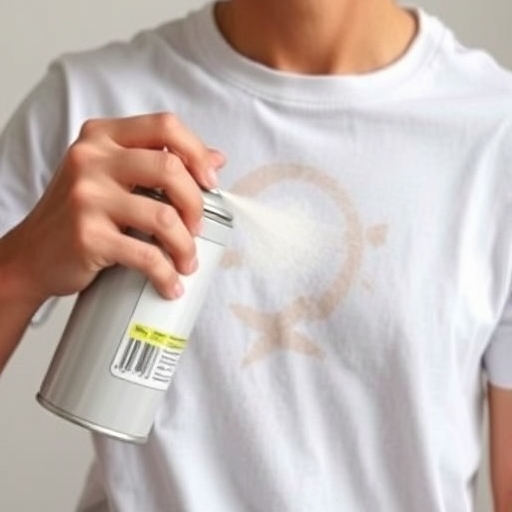How to Get Spray Paint Off Clothes: A Comprehensive Guide
Spray paint can be an excellent tool for crafting and home improvement projects, but it can also lead to unfortunate accidents, especially when it ends up on your favorite clothes. Whether it’s a small splatter or a larger stain, getting spray paint out of fabric can be a daunting task. In this article, we will explore various methods to effectively remove spray paint from clothes, tips for prevention, and answers to frequently asked questions.
Understanding Spray Paint Stains
Before diving into removal techniques, it’s essential to understand how spray paint interacts with fabric. Spray paint is designed to adhere to surfaces, which makes it particularly challenging to remove from clothing. The paint contains solvents that can penetrate the fibers of the fabric, creating a strong bond. The sooner you act after a spill, the better your chances of successful removal.
Types of Fabrics and Their Reactivity to Spray Paint
Different fabrics react differently to spray paint. Here’s a quick rundown:
| Fabric Type | Reactivity to Spray Paint | Removal Difficulty |
|---|---|---|
| Cotton | Low | Easy |
| Polyester | Moderate | Moderate |
| Wool | High | Difficult |
| Denim | Low | Easy |
| Silk | High | Very Difficult |
Steps to Remove Spray Paint from Clothes
Step 1: Act Quickly
The sooner you address a spray paint stain, the more effective your removal will be. If you notice a fresh stain, follow these steps:
1. Do Not Rub: Avoid rubbing the stain, as this can spread the paint and push it deeper into the fabric.
2. Blot the Excess: Use a clean cloth or paper towel to blot the stain gently, removing any excess paint without spreading it.
Step 2: Choose Your Cleaning Method
Depending on the type of fabric and the severity of the stain, you can choose from various cleaning methods:
Method 1: Using Rubbing Alcohol
Rubbing alcohol is a powerful solvent that can break down the paint.
Materials Needed:
- Rubbing alcohol (isopropyl alcohol)
- Cotton balls or clean cloth
- Mild detergent
- Water
- Acetone (nail polish remover)
- Cotton balls or clean cloth
- Mild detergent
- Water
- Commercial paint remover (ensure it’s fabric-safe)
- Gloves
- Mild detergent
- Water
- Wear Protective Clothing: Use an old shirt or apron when working with spray paint.
- Cover Your Work Area: Lay down drop cloths or newspapers to protect surfaces.
- Use Spray Paint in a Controlled Environment: Work outdoors or in a well-ventilated area to minimize overspray.
- Best Method: Rubbing alcohol or soap and water.
- Tip: Wash immediately after treatment to prevent setting.
- Best Method: Acetone or commercial paint removers.
- Tip: Test fabrics first to avoid damage.
- Best Method: Professional cleaning is often recommended.
- Tip: Do not use harsh solvents as they can damage the fibers.
Instructions:
1. Place a clean cloth under the stained area to avoid transferring paint to other parts of the garment.
2. Soak a cotton ball in rubbing alcohol and gently dab the stained area.
3. Allow the alcohol to sit for about 10 minutes to penetrate the paint.
4. Blot the area with a clean cloth, absorbing the paint.
5. Wash the garment in cold water with mild detergent.
Method 2: Using Acetone (Nail Polish Remover)
Acetone is another effective solvent for removing spray paint, but it can damage some fabrics, so use caution.
Materials Needed:
Instructions:
1. Test a small, inconspicuous area of the fabric to ensure acetone does not cause damage.
2. If safe, saturate a cotton ball with acetone and dab the stained area.
3. Let it sit for a few minutes, then blot with a clean cloth.
4. Rinse the area with cold water and wash as usual.
Method 3: Using Commercial Paint Removers
If home remedies don’t work, consider using a commercial paint remover designed for fabrics.
Materials Needed:
Instructions:
1. Follow the manufacturer’s instructions on the product.
2. Apply the paint remover to the stained area using gloves.
3. Blot with a clean cloth and rinse thoroughly.
4. Wash the garment in cold water with mild detergent.
Step 3: Wash and Dry
After treating the stain, wash the garment as per the care label instructions. Avoid using hot water, as this can set the stain. Once washed, check the stain before drying; if it’s still visible, repeat the cleaning process. Do not put the clothing in a dryer until the stain is completely gone, as heat can set the paint.
Preventative Measures
While accidents happen, there are ways to minimize the risk of getting spray paint on your clothes:
Additional Tips for Specific Fabrics
Cotton and Denim
Polyester and Synthetic Blends
Wool and Silk
Frequently Asked Questions (FAQ)
Can I use bleach to remove spray paint stains?
Bleach is not recommended for spray paint stains as it can cause discoloration and damage to the fabric. Stick to solvents like rubbing alcohol or acetone.
What if the stain is dried?
If the paint has dried, you can still use rubbing alcohol or acetone, but you may need to let it sit longer to penetrate the paint.
Will washing remove all spray paint stains?
Not necessarily. Some stains may require multiple treatments or professional cleaning to fully remove.
Can I remove spray paint from my clothes at home?
Yes, many methods are available for DIY removal, but results can vary based on the fabric and the type of paint.
Is there a difference between spray paint and regular paint stains?
Yes, spray paint typically contains more solvents and can adhere more firmly to fabrics than regular paint, making it more challenging to remove.
Conclusion
Removing spray paint from clothes can be a challenging task, but with the right approach and materials, you can significantly improve your chances of success. Remember to act quickly, choose the appropriate cleaning method for your fabric type, and always test solvents on a hidden area first. By following these steps, you can keep your wardrobe safe from accidental paint mishaps and enjoy your crafting projects without worry.

